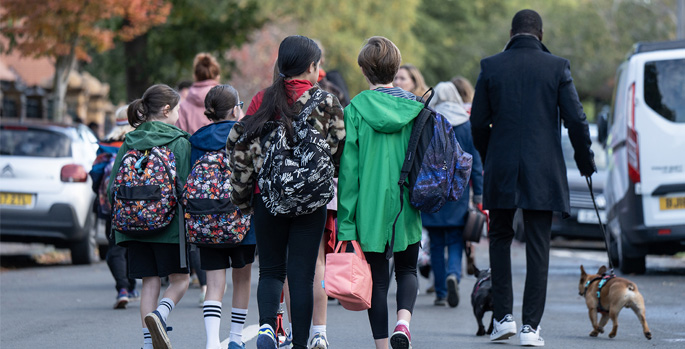Greater Manchester is set to increase its number of school streets to 60 over the next year, with the goal of reaching 100 by 2028.
Last October, active travel commissioner Dame Sarah Storey and Mayor Andy Burnham invited schools across the city-region to develop their own ‘School Streets’ plans to reduce traffic during the start and end of the school day.
The programme has been awarded £1.3m of active travel funding, according to Transport for Greater Manchester (TfGM), and has already seen a strong response. It states that 10 local authorities have requested funding to deliver new schemes, with the total number in operation on track to increase from 37 to 60 in the next year.
In a press release, TfGM stated that research shows just half of Greater Manchester’s residents feel it is safe for children to walk to school – and just 42% believe it is safe for children to cycle to school. It also added that roughly one third of traffic at peak times in the morning or afternoon is from school commutes.
Dame Storey said: ‘We are taking the necessary steps to make it safe for children to walk, wheel, scoot or cycle to school in Greater Manchester. This should be a fun time of day for them where they can let off steam before starting the school day or one their way home.
‘Good progress is being made and I expect this to now accelerate so that by July 2026 and the end of the next academic year, the number of School Streets in operation will have increased to 60.
‘As outlined in the mayor’s manifesto, the long-term ambition is to increase this figure to 100 by 2028. As part of that work I am also keen to learn how we can really strengthen the collaboration between schools and their communities by using their School Street as a catalyst for change, as well as exploring enforcement solutions that enables each scheme to run without the need for volunteers, across a range of different locations.
‘It is essential a permanent solution that doesn't try to rely on volunteers is found to ensure every School Streets is viable, long-term and will therefore benefit school pupils and communities across our city-region for years to come.’
Cllr Tracey Rawlins, executive member for clean air, environment and transport for Manchester City Council, added: ‘School Streets have been a transformative initiative, helping to change the way we think about the morning school run, and children tell us first hand of the positive difference it's making so they are going into school feeling less anxious and happier.'
To learn more about School Streets, be sure to read our report in the April issue of Highways, in which Mr Nick Flood, associate director at Waterman Aspen, and Mr Mark Woodhead, regional director at Waterman Aspen, share some of their work in helping local authorities implement School Streets and some of the difficulties that can occur.
Both Mr Wood and Mr Flood also appear on the latest episode of The Engineer Exchange, a podcast from Waterman Aspen, which delved into the world of School Streets earlier this month with Ms Liz Brooker MBE, road safety and sustainable transport manager for the London Borough of Lewisham, and explored their experiences working on School Street schemes.






